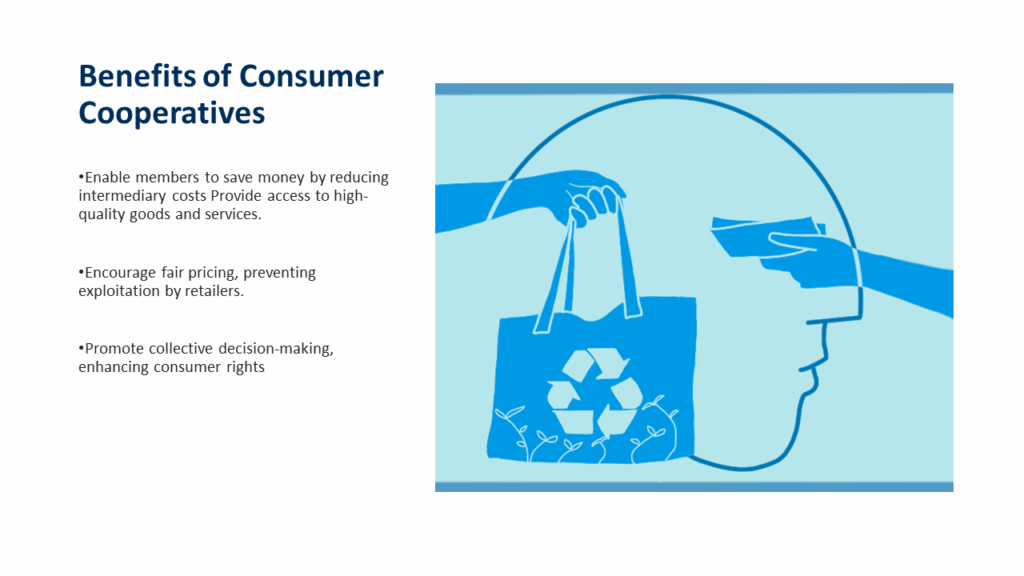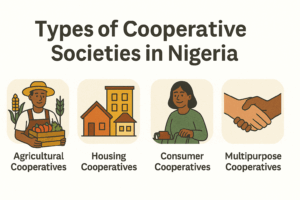Introduction
Cooperative societies in Nigeria play a crucial role in fostering economic stability, financial inclusion, and social support for their members. These organizations function as platforms where individuals with common goals come together to pool resources and achieve mutual benefits. From financial empowerment to personal development, cooperatives help bridge gaps in critical areas of need.
What Are Cooperative Societies?
Cooperative societies are member-driven organizations built on principles of mutual assistance, shared responsibility, and democratic management. Their primary aim is to address the economic, social, and cultural needs of their members. In Nigeria, cooperatives contribute significantly to community development, financial literacy, and poverty alleviation.
Consumer Cooperatives
Consumer cooperatives exist to help members access goods and services at lower costs by buying in bulk and distributing among members. They play a vital role in stabilizing market prices and ensuring the availability of quality products for their members. These cooperatives are especially beneficial in urban areas, where living costs are higher, and collective bargaining can reduce expenses.

Credit and Thrift Cooperatives
Credit and thrift cooperatives, such as GTCS, are dedicated to fostering financial empowerment among their members. At GTCS, members contribute savings periodically, creating a pool of funds that is utilized to provide loans at reasonable interest rates. This model not only encourages a savings culture but also ensures members have access to financial support when needed.
GTCS plays a crucial role in empowering small-scale entrepreneurs and individuals by offering them the capital they need for personal or business development. Through innovative programs and tailored financial solutions, GTCS continues to drive economic growth and uplift the financial well-being of its members.
How They Work
- Members agree on regular contributions, creating a pool of funds
- Loans are disbursed to members based on agreed terms
- Interest rates are lower compared to commercial banks, making loans more accessible
- These cooperatives foster a culture of saving and financial responsibility.
Agricultural Cooperatives
Agricultural cooperatives focus on boosting productivity among farmers by providing essential resources like seeds, fertilizers, and equipment. They also facilitate access to markets, training, and government initiatives, enabling farmers to improve yields and livelihoods. Such cooperatives often organize bulk purchasing and shared logistics to reduce operational costs for members.
Benefits for Farmers
- Access to subsidized inputs and shared resources.
- Collective marketing of produce for better prices.
- Technical training and capacity building.
- Stronger negotiation power with buyers and suppliers.
Housing Cooperatives
Housing cooperatives enable members to pool resources for acquiring land, constructing homes, or accessing affordable housing options. These cooperatives address the pressing issue of housing shortages in Nigeria by providing long-term repayment plans and support for sustainable living solutions.
Key Features
- Group ownership of property and shared responsibility for maintenance.
- Affordable repayment structures tailored to member needs.
- Opportunities for low-income earners to achieve homeownership.
- Encouragement of community living and shared values.
Worker Cooperatives
Worker cooperatives are enterprises owned and operated by their employees. Members share profits, contribute to decision-making, and collectively work towards achieving business goals. These cooperatives promote fair labor practices and foster inclusive economic growth.
Advantages
- Democratic governance where all members have equal say.
- Higher job satisfaction due to shared ownership and responsibilities.
- Better working conditions and equitable profit-sharing.
- Encourages innovation and collaborative problem-solving.
Multipurpose Cooperatives
Multipurpose cooperatives combine various functions, such as savings, loans, consumer services, and welfare support, to cater to the diverse needs of members. These cooperatives are ideal for individuals seeking holistic financial and social benefits in one organization.
Why Choose Multipurpose?
- Access to a wide range of services under one roof.
- Tailored solutions for diverse member needs.
- Encourages active member engagement across multiple domains.
- Fosters community development and individual growth.
Challenges Faced by Cooperatives
While cooperatives provide numerous benefits, they also face challenges such as loan defaults, mismanagement, and member apathy. Addressing these issues is critical to ensuring their sustainability and effectiveness in delivering value to members.
Solutions to Challenges
- Establish transparent policies and enforce accountability measures.
- Encourage active participation through regular meetings and member education.
- Conduct audits to identify and address financial discrepancies.
- Invest in leadership training and capacity building for cooperative leaders.
Why Cooperatives Matter in Nigeria
Cooperative societies play an essential role in empowering individuals and communities. They foster economic growth, enhance financial inclusion, and build social cohesion. For many Nigerians, cooperatives represent a pathway to improved living standards and economic security.
How to Join
- Research and identify a cooperative that aligns with your goals and interests
- Fulfill membership requirements, which may include a registration fee or initial deposit
- Participate actively in cooperative activities and contribute towards its growth
- Take advantage of the services and opportunities offered to members.
Conclusion
Cooperative societies are powerful tools for achieving personal and community goals. By joining a cooperative, you can access financial support, enhance your skills, and contribute to collective development. Take the first step today and explore the opportunities cooperatives can offer!


